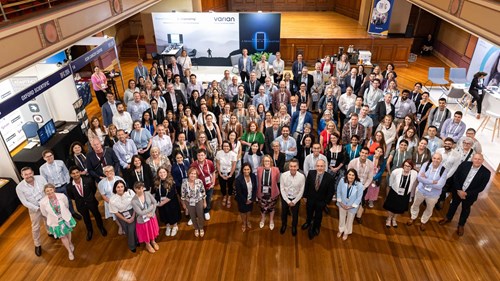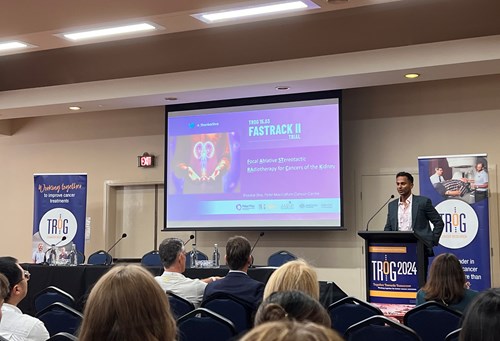- Category Marryalyan
- DATE 23 Apr 2024
TROG Cancer Research
April 2024

2024 TROG Cancer Research Annual Scientific Meeting
TROG Cancer Research is thrilled to announce the successful conclusion of our 36th Annual Scientific Meeting, which took place at City Hall in our hometown of Newcastle, NSW, from March 12th to 15th. We extend our heartfelt gratitude to all the sponsors, particularly major sponsors Varian, Elekta, and ICON, as well as ASN Events and Co-convenors Jane Ludbrook and Joerg Lehmann, who led the 36th ASM organising committee. The invaluable contributions of our delegates made this event a resounding success.

It was wonderful to see more than 250 delegates travel from across the country, New Zealand, and beyond. From insightful presentations and workshops to engaging discussions, the meeting provided a platform for cutting-edge research and collaboration in radiation therapy. This year's Clinical Research Education and Technical Research workshops both hosted groups of 61 participants, and the RANZCR SMART workshop comprised 37, with high levels of engagement from all of this year's participants. ASM presentation highlights included our keynote speakers Prof. Stephane Supiot who travelled from France to present on Vascular remodelling during radiotherapy at low and ultra-high dose rate (FLASH) and USA's Prof. Stephen Kry who presented in plenary sessions for both Head Neck & Skin and Radiobiology.

The Gala Dinner again proved fun for all with the Black tie on the Beach theme. Taking away TROG awards for this year, we congratulate Shankar Siva for the Trial Excellence award for the FASTRACK II trial, Lachlan McDowell for the Emerging Researcher award and Nick Hardcastle for the Outstanding Contribution to Radiation Therapy Quality Assurance award (kindly sponsored by Radformation and Gamma Gurus).
We are already looking ahead to our 37th ASM to be held in Brisbane from 18th to 21st March 2025.
TROG Board of Directors Update
During our 2024 Annual Scientific Meeting, we announced that A/Prof. Puma Sundaresan will be stepping in as the TROG President. During her time as a Director with TROG, Puma has demonstrated exemplary leadership qualities, having served on numerous committees within and externally to TROG and takes the baton from Prof. Trevor Leong who will continue serving on the Board of Directors for a transition period.
A/Prof. Georgia Halkett was appointed to the TROG Board of Directors at the TROG 2024 Annual General Meeting. Georgia is a senior research fellow at Curtin University and co-leader for the Cancer Domain in the Curtin Health Innovation Research Institute, and we welcome her fresh perspectives.
In addition to Georgia joining the Board, Dr. Melissa James was re-elected as the New Zealand representative, reaffirming her pivotal role in fostering collaborations and partnerships within the region.
It is with gratitude and appreciation that we note the departure of Dr. Fiona Hegi-Johnson from our TROG Board, who not only served as a valued member of our Board but also made significant contributions to the FARM Committee.
Recent Developments from the TROG 15.03/ANZUP 16001 FASTRACK II Trial
Congratulations to the entire TROG 15.03/ANZUP 16001 FASTRACK II team on the momentous achievement of featuring their study results in The Lancet Oncology. (https://www.thelancet.com/journals/lanonc/article/PIIS1470-2045(24)00020-2/abstract?utm_source=hs_email&utm_medium=email&_hsenc=p2ANqtz-8YLFbTTxDf51yyoa7JHHvWqQqlqegSWScojPq23QGpcSGuLNwoXmT_wZc8v5AfFfG728YS)
Initiated in 2016, FASTRACK II trialled Stereotactic Ablative Body Radiotherapy (SABR) as an alternative treatment option for patients with Renal cell carcinoma (RCC) who were not suited to surgery and challenged conventional approaches. Implemented across eight centres in Australia and the Netherlands, this study investigated the effectiveness of SABR and assessed its associated side effects.
At the primary analysis, the trial enrolled 70 patients, with a median follow-up period of 43 months. The analysis findings were remarkable: 100% of treated kidney cancers showed no signs of recurrence, even in cases with an average tumour size of 4.6cm. Notably, only 10% of participants experienced significant treatment-related side effects, marking a noteworthy milestone in cancer care.
The study's success positions SABR as an excellent option, especially for patients with larger inoperable tumours, where alternative treatments are limited. The FASTRACK II signifies a turning point in progress for the treatment of kidney cancer, presenting a compelling avenue for future advancements in radiation oncology.
This accomplishment is a testament to the team's collective dedication, expertise, and collaborative spirit and their unwavering commitment to advancing medical research and enhancing outcomes for patients with kidney cancer through the FASTRACK II clinical trial. The publication of the study in The Lancet Oncology acknowledges its significance and impact and underscores its contribution to advancing medical knowledge and improving patient care worldwide.
TROG commends the team for its outstanding perseverance, dedication, and tireless efforts throughout the trial. Their ground-breaking work will undoubtedly inspire future advancements and innovations in the field, ultimately benefiting countless patients and communities.
Open TROG Cancer Research Trials
TROG 18.01 NINJA
The NINJA trial is looking at comparing two different radiotherapy treatment schedules called stereotactic body radiotherapy (SBRT). The aim is to develop better methods of treatment for prostate cancer using this type of treatment, and further understand what causes some of the side effects of treatments.
The trial has currently recruited 319 patients of the 472-accrual target and is open for recruitment at 20 sites across Australia and New Zealand.
TROG 18.06 FIG
The FIG trial is investigating how the addition of FET-PET imaging to standard MRI imaging affects radiation target volume delineation and treatment planning for Glioblastoma, as well as determining the accuracy and management impact of FET-PET in distinguishing pseudoprogression from true tumour progression and / or tumour recurrence.
The trial has currently recruited 176 patients of the 210-accrual target and is open for recruitment at 11 sites across Australia and New Zealand.
TROG 19.06 DECREASE
DECREASE aims to determine that the combination (Darolutamide + RT) is better than Darolutamide alone at controlling PSA levels and further spread of prostate cancer.
The trial has currently recruited 54 patients of the 87-accrual target and is open for recruitment at 17 sites across Australia, New Zealand and Singapore.
TROG 20.01 CHEST RT
CHEST RT is investigating the safety and effectiveness of combining chemotherapy and immunotherapy with chest radiation therapy for the treatment of extensive stage small cell lung cancer.
The trial has currently recruited 30 patients of the 35-accrual target and is open for recruitment at eight sites across Australia and New Zealand.
TROG 21.07 SOCRATES HCC
SOCRATES HCC investigates whether a radiotherapy technique (called SABR) can treat early-stage liver cancer more effectively than current treatments which use heating probes directly inserted into the tumour or chemotherapy or radioactive particles injected into the blood supply of the tumour.
The trial has currently recruited 39 patients of the 218-accrual target and is open for recruitment at 16 sites across Australia and New Zealand.
Join Australia's leading oncology community & make an impact
Become a COSA memberTwitter
@COSAoncology
Follow

COSAoncology 2 days ago
RT by @cosaoncology: 👁️ The 2024 Australasian Ocular Melanoma Alliance (AOMA) Virtual Summit program is now available! 5 International speakers 11 Australian #ocularmelanoma experts 4 Ocular melanoma consumers Sat 15 June - Registration is free! Watch from anywhere worldwide! masc.org.au/aoma-summit/
Read More >
COSAoncology 5 days ago
RT by @cosaoncology: 🚨Survivorship Care for People affected by Advanced or Metastatic Cancer🚨 💥 MASCC-ASCO Standards / Practice Recommendations now published💥 ‼️ Clinical tools online ‼️ 14 languages (coming soon) Co-published open access: ascopubs.org/doi/full/10.12… and link.springer.com/article/10.100…
Read More >
COSAoncology 5 days ago
Last chance to save! Join or renew your COSA membership before 30 April 2024 to secure the 2023 member rate before they increase for 2024: bit.ly/3hXsDLm
Read More >
COSAoncology 8 days ago
Missed the earlybird pricing for the COSA Cancer Pharmacists Group Education Program? You can still save if you join COSA or renew your membership before 30 April 2024! Members save on CPG registration fees - bit.ly/3aNqaSr
Read More >
COSAoncology 8 days ago
COSA Groups create spaces to share ideas and information, work on projects and research, and contribute to COSA Council. To stay updated, make sure you update your Groups preferences when you renew your COSA membership. More: bit.ly/3emnboq
Read More >
COSAoncology 10 days ago
RT by @cosaoncology: 🎙️Join Kim Hobbs at the Redefining Survivorship webinar! From navigating uncertainty to addressing financial burden and psychological challenges, Kim will offer invaluable advice for supporting people with treatable, but not curable cancers. Register here: tinyurl.com/yc89zvmk
Read More >
COSAoncology 10 days ago
COSA's April eNews is in members' inboxes now ... ... and available to COSA members at bit.ly/4aNLTG6
Read More >
COSAoncology 11 days ago
It only takes a few minutes to join COSA – Don't forget if you join by 30 April 2024 you will get bonus months of membership, and save on member rates before prices increase for 2024! Join now: bit.ly/3hXsDLm
Read More >
COSAoncology 12 days ago
These steps show how to renew your COSA membership. Are you a nurse, have you been a student or in training and need to change your member type? Login first, then go to member types to select your new category: bit.ly/3s5mOC6
Read More >
COSAoncology 16 days ago
COSA Groups reflect an interest in a tumour stream or specific cancer, age group, area, discipline or movement. When you join COSA, you can opt in to any number of Groups to reflect your specific interests in COSA. More: bit.ly/3emnboq
Read More >